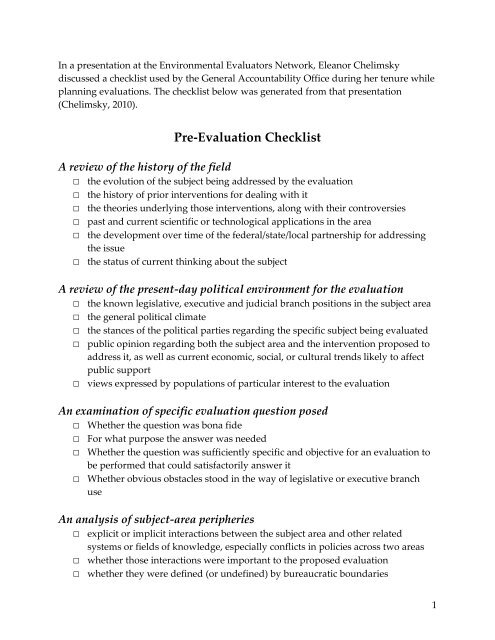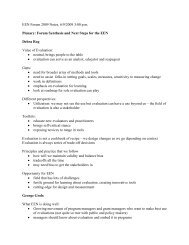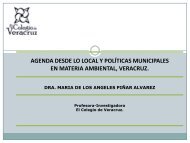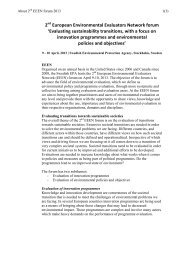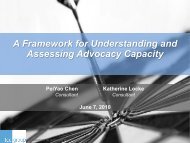Pre-Evaluation Checklist - Environmental Evaluators Network
Pre-Evaluation Checklist - Environmental Evaluators Network
Pre-Evaluation Checklist - Environmental Evaluators Network
You also want an ePaper? Increase the reach of your titles
YUMPU automatically turns print PDFs into web optimized ePapers that Google loves.
In a presentation at the <strong>Environmental</strong> <strong>Evaluators</strong> <strong>Network</strong>, Eleanor Chelimsky<br />
discussed a checklist used by the General Accountability Office during her tenure while<br />
planning evaluations. The checklist below was generated from that presentation<br />
(Chelimsky, 2010).<br />
<strong>Pre</strong>-<strong>Evaluation</strong> <strong>Checklist</strong><br />
A review of the history of the field<br />
□ the evolution of the subject being addressed by the evaluation<br />
□ the history of prior interventions for dealing with it<br />
□ the theories underlying those interventions, along with their controversies<br />
□ past and current scientific or technological applications in the area<br />
□ the development over time of the federal/state/local partnership for addressing<br />
the issue<br />
□ the status of current thinking about the subject<br />
A review of the present-day political environment for the evaluation<br />
□ the known legislative, executive and judicial branch positions in the subject area<br />
□ the general political climate<br />
□ the stances of the political parties regarding the specific subject being evaluated<br />
□ public opinion regarding both the subject area and the intervention proposed to<br />
address it, as well as current economic, social, or cultural trends likely to affect<br />
public support<br />
□ views expressed by populations of particular interest to the evaluation<br />
An examination of specific evaluation question posed<br />
□ Whether the question was bona fide<br />
□ For what purpose the answer was needed<br />
□ Whether the question was sufficiently specific and objective for an evaluation to<br />
be performed that could satisfactorily answer it<br />
□ Whether obvious obstacles stood in the way of legislative or executive branch<br />
use<br />
An analysis of subject-area peripheries<br />
□ explicit or implicit interactions between the subject area and other related<br />
systems or fields of knowledge, especially conflicts in policies across two areas<br />
□ whether those interactions were important to the proposed evaluation<br />
□ whether they were defined (or undefined) by bureaucratic boundaries<br />
1
□ whether there were potential data sets stemming from those interactions<br />
□ related areas of expertise<br />
□ overlap of subject and function among levels of government<br />
A review of the lessons and experience of past evaluative work in the field<br />
□ what was the evaluation question and what overall design was used<br />
□ what comparisons were made, and what data were collected<br />
□ what program challenges had to be overcome<br />
□ what were the major strengths the weaknesses of the methodology, and what<br />
efforts were made to compensate for the weaknesses<br />
□ what findings were produced, what controversy was experienced, and what use,<br />
if any, was made of the findings<br />
Chelimsky, E. (2010, June). Navigating evaluative complexity in the age of Obama. Paper<br />
presented at the <strong>Environmental</strong> <strong>Evaluators</strong> <strong>Network</strong>, Washington, DC.<br />
Retrieved June 20, 2010 from<br />
http://www.nfwf.org/Content/NavigationMenu/GrantPrograms/<strong>Evaluation</strong>/defa<br />
ult.htm<br />
2


